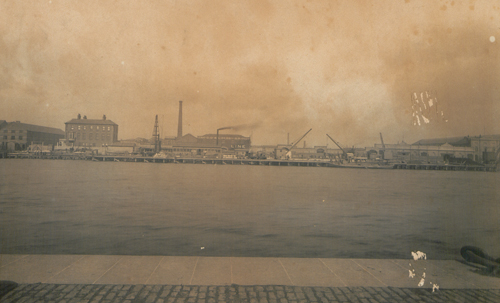14,000 unemployed as a result of Dublin Port Strike
Dublin, 11 July 1923 - The numbers unemployed as a result of a strike at Dublin Port is now estimated to be 14,000. The figure would certainly be higher were it not for the actions of certain firms to charter vessels to enable them to continue their businesses.
The strike action, which involves seamen and firemen - both members of the ITGWU -has had a wide impact as the clerical staff of the lines involved in the dispute have already gone on their summer holidays and temporary customs clerks have been required to seek work elsewhere. Carters engaged in carting from the B & I and the Silloth sheds have also joined the ranks of the unemployed.
It is understood that officials of the ITGWU called a mass meeting at Liberty Hall for today of seamen, firemen, dockers, carters and others affected by the strike to gauge the current state of opinion.
The continuation of the strike action is certain to be putting a strain on the ITGWU’s finances as it is required to provide for unemployment pay - and at a time when it is also bearing the costs of the Waterford farm strikes, the Athy Labourer’ strike and a lockout of wholesale druggists’ employees in Dublin.
The strike has arisen out of a determination on the part of the Shipping Federation to reduce the wages of dockers at all Free State Ports by 6s per week in three installments, the first cut of 2s to take effect on July 16, with further cuts scheduled for next October and January. The action of the Shipping Federation followed the failure to secure reduced wages by means of negotiation.
However, the strike has done much to expose divisions within the trade union movement. According to an Irish Independent report from yesterday, the striking seamen had scuppered efforts by the ITGWU to secure a settlement with the employers through a Conference by putting forward claims the union could not support.
Lar Joye provides an overview of the history of Dublin Port and the city it serves. For more on Dublin Port heritage and archive, visit https://www.dublinportarchive.com/
An official statement issued by the ITGWU on July 9th, noted that the parties to the conference in the dispute affecting the sailors and firemen at Dublin Port had met at Government buildings. The ITGWU statement claims that at a preliminary meeting with the men’s representatives a statement of the conditions on which they would resume work was put forward. The Union officials present informed the conference that this statement had not been submitted to the responsible officers of the Union, and consequently that it could not be regarded as authorised. The men adhered to the statement and it being evident that in these circumstances no progress could be made, the proceedings terminated.
Beyond the impact of the strike on the workers and their families and on the finances of the union, owing to the use of chartered vessels, initial fears about shortages of food and foodstuffs have not been realised. Dublin City bakeries are reporting no shortage of flour and leading merchants of tea and sugar are indicating that there would be no shortage of either of those goods unless Dublin Port shut down completely.
Such a possibility cannot of course be ruled out while the strike action is still ongoing. And while the dispute at Dublin Port rumbles on, another involving employees of picture houses and theaters in Dublin has ended. Proposals submitted to workers at Liberty Hall by Alderman Alfred Byrne, Acting Lord Mayor of Dublin, were accepted on June 29th and the theaters and picture houses re-opened soon after.
[Editor's note: This is an article from Century Ireland, a fortnightly online newspaper, written from the perspective of a journalist 100 years ago, based on news reports of the time.]





















